Number Please, AEF - Telephone Operators in France - 1921
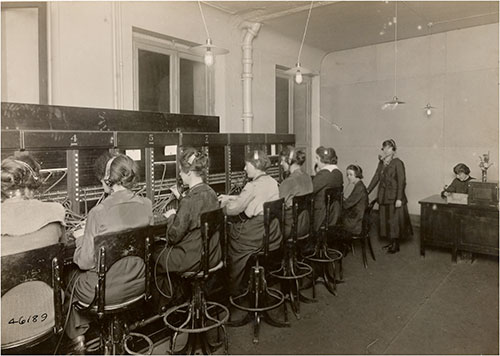
Signal Corps Telephone Exchange Switchboard at Bordeaux, Gironde, France. At Switchboard, Left to Right: Miss Laborde; Miss Fairbrother; Miss Dickerson; Miss Blanc; Miss Knall; Miss Honey; and Grande-Maître Miss Sage (supervisor), Miss Snow, Chief Operator at Desk at the End of the Room. Photograph by Lt. Strohmeyer, Signal Corps, 10 January 1919. National Archives and Records Administration, 111-SC-46189. NARA ID # 86698547. GGA Image ID # 199e5b591a
It was one of those start-stop trains en route to Bordeaux. Just now, it was in the stop stage, having run twenty consecutive minutes.
The stop was designated on the station sign as Libourne. It was a long, long stop. Four restless doughboys trudged through the corridor of the train. They passed a compartment containing five representatives of the fair sex. They paused and looked in uncertainly.
"Combien kilos a Bordeaux, s'il vous plait?" one of the doughboys inquired.
"I'm sure I don't know," was the weary response. "I only wish I did!"
Four doughboys staggered back in unison. Four doughboys rubbed their eyes and stared.
In a dazed sort of way, they asked, "Are—are you Americans?"
"You can bet your tin hat we are!" was the answer, and that, of course, settled it.
No English girl—of whom the doughboys had seen a goodly number in France—could talk like that. She might imitate the "American accent" (as the English have it), but it would never occur to her to suggest the wager of a tin hat.
But how did these girls get here? What were they doing in this war-torn land, thousands of miles away from home and safety and comfort?
Who were these trim figures in smart, blue uniforms, blue aviator caps, and white brassards on their left sleeves?
The doughboys soon found out.
They had come face to face with sisters of that personage back home whom they had known only as a Voice. They beheld Central in the flesh.
One of the pluckiest groups of Americans had come to help them win the fight for democracy.
American girls!
In the truest sense of the term, they were a sight for sore eyes.
"Where are you from in the States? How long have you been here? How do you like France? Where are you stationed? What do those insignia mean? You're the first American girls we've seen or talked to in the last eight months."
Precisely as ever, they answered the breathless inquiries.
"I'm from New York. Miss ______is from Minnesota. Misses ________ and ________ are from California. Miss________ is from Massachusetts. We've been here ten days.
Fine—so far. At Bordeaux, where we're bound for now. Telephone transmitter embroidered in black means junior operator; laurel wreath beneath transmitter, supervisor; both, surmounted by a streak of lightning, chief operator.
We're mighty glad to see you, too. And we're mighty hungry."
That was enough for the boys. They became, on the instant, Big Brothers, by natural right.
They had been gassed, these boys, and were on their way to the hospital at Bordeaux. But what of it? What was a little thing like that to this newborn, undeniably pleasing sensation of responsibility?
They foraged around until they found some hard rolls in one of the stations, they filled their canteens with water, they salvaged a cake of chocolate minus a generous half-portion that had been gnawed away—and the resultant meal was flavored with what many a sumptuous banquet has lacked.
One of the foreign words heard a great deal during the war was morale. It has since been naturalized and given the full rights of American citizenship.
It was a word the meaning of which was fully understood by General Pershing and his staff. And it may have been that something of its meaning was in their minds when they called for the creation of a Telephone Operating Unit to serve overseas as part of the Signal Corps.
But whether intentional or not, the connection between these girls and the morale of the American Army was certainly there. For proof, I cite one of the stories sent home by a war correspondent. War correspondents are supposed to be the most blasé personages in the world.
The sweetest, most homelike sound I have heard since leaving the States was the voice of a telephone girl.
This is said in the most impersonal way, as I never saw the lady.
It seems to be my fate to have the blues during my first three days in each big city. That was undoubtedly my unhappy lot in Paris.
On the third day, business prompted that I call up Mr. Sharp, the U. S. Ambassador.
Not being hep to the French language, the hotel interpreter was requisitioned. He wrote down some figures and told me to make certain noises that sounded something like "passy douze cinkante."
I tried my best to gargle that into the phone but evidently didn't say the right thing because there was a female gasp at the other end. Then I tried harder and louder than before. An uncontrollable giggle answered this.
"Whom do you really want?" came back in perfect English.
"Possibly I can help you."
It took me a full minute to recover.
"I want the American Ambassador—God bless you!"
"Oh, his number is 1250," the same being spoken in my own language better than I can speak it myself.
With my abalone-like ear wrapped around that receiver and listening for all I was worth for that voice; I could have imagined myself in a certain well-known office at First and Broadway.
It broke up the blues. I wanted to give three cheers for something or other. I breathed a silent prayer that all the hello girls in the world might prosper and marry well.
I reckon that the well-modulated, courteous, and very American accents of a hello girl dripping in at the left ear have much the same effect on a homesick American as the soothing hand of a nurse on a sick soldier. (Note 1)
But morale was not the reason officially assigned to create this remarkable addition to the Signal Corps family.
"The use of female telephone operators in France," according to the official Report of the Chief Signal Officer (Note 2), "was decided upon for two reasons. The first of these was the unquestioned superiority of women as telephone switchboard operators ------"
For if it is true that the hand which rocks the cradle rules the world, it is also true that the soft answer which turneth away wrath—the voice with the smile—is exceedingly effective in expediting the all-important telephone connections under the stress of combat, when tempers are apt to ruffle and cuss words to impede the channels of swift intercourse.
"------ and the second (i. e. reason) was the desire to release for service in the more dangerous telephone centrals at the front the male operators on duty in the larger offices."
(It was not then contemplated to use women operators for switchboard duty at the front. That came later, when these game girl soldiers, filled with the spirit of service in the great cause, eager to go—volunteering on every available occasion to go—to the forward areas, had their share in plugging away by candlelight in the subterranean depths of an army exchange. )
A veritable tidal wave of excitement swept across every telephone switchboard, from Maine to California, when General Pershing's cable of 8 November 1917, called for creating a Woman's Telephone Operating Unit was announced from Washington.
The overseas trumpet was calling to the women of the land! What a chance for the adventure-loving American girl! Thousands of feminine breasts beat violently, thousands of pulses quickened in answer to the summons. The first call, to be exact, was answered by 7600 applications.
But two huge impediments loomed up at the very outset as grim eliminators in the sharp contest evoked by this call from the other side.
First, General Pershing's requirements were ruthlessly limited on the first call to an even one hundred: "3 chief operators at $125 a month, 9 supervising operators at $72 a month, 24 long-distance operators at $60 a month, 54 operators at $60 a month, 10 substitute operators at $50 per month, total 100."
It was to be a select band indeed!
But that wasn't all. These girls must be able to understand and speak French as well as English.
For the great majority of trained operators, this requirement was a knock-out blow.
"To think," lamented one of the operators, "that I didn't take French in school, as my mother wanted me to, but instead—of all things—German!"
"Never mind, dearie," was the consoling advice of her friend, "your chance will come when the boys get to Berlin."
But Pershing's bilingual stipulation was not an idle one, as the girls were ultimately to realize. For they were to serve, in very truth, less as operators than as interpreters by telephone—often on the most vital matters—-where a mistake might mean irreparable loss.
At St. Mihiel, for example, the Army had to handle an immense amount of telephone communication with the French armies on its right and left, with French corps in the Army, with the French group of armies, and finally with General Headquarters. Similar conditions applied throughout the A. E. F. during the early months.
It was not until the later phases when the more significant part of telephone service in the A. E. F. came to be transacted between American offices. This requirement of familiarity with the French language was relaxed in favor of long-distance operating experience.
And so, the first 100 girls selected from the thousands that applied needed to know and speak French virtually as well as their native tongue. But they also must be qualified, to an exceptional degree, as switchboard operators.
That naturally threw the job of securing, examining, selecting, and training these girls upon the telephone organizations' shoulders.
At the request of the Signal Corps, the Engineering Department of the American Telephone and Telegraph Company, with the assistance of the operating companies of the country, undertook to secure the necessary operators and to tum them over to the Signal Corps properly trained, organized in groups and equipped to start for France.
A canvass of the telephone forces soon revealed that a sufficient number of French-speaking operators were not available inside the organization. A considerable number, therefore, would have to be obtained from the outside.
The Process of Selection Began
Miss de Blank, say, of Minnesota, is one of those that have applied, along with thousands of others. Her turn for examination finally comes. She presents herself at the offices of the Northwestern Bell Group.
She is led to an inner sanctum with a beating heart, containing a single table, with a telephone on it and a chair.
"Be seated, please." The attendant disappears, and she is alone.
The bell chimes. Somewhat uncertainly, without having been instructed to do so, she answers the telephone.
"Hello," comes a strange voice into the receiver. “This is the Adjutant, ___th Division, located at ________, in France. The Commanding Officer, General Jones, wants to talk to Colonel La Roux of the ___th Brigade, ___th French Army Corps, located at ________. General Jones understands no French, and Colonel La Roux understands no English.
It will be necessary for you to translate General Jones's message into French and Colonel La Roux's reply into English. Ready? Hello, this is General Jones now speaking."
"General Jones," having delivered his message, is suddenly transformed into "Colonel La Roux," and receives the translated message. At which point, the supposed French Colonel gives his reply in French and, in General Jones's role, gets his response in the desired English.
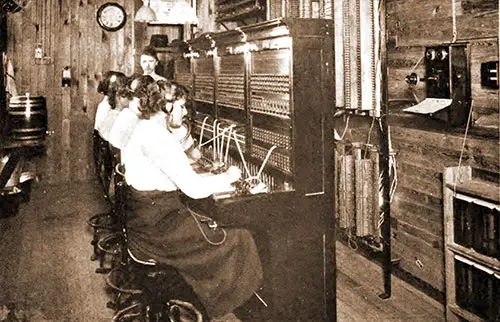
Inside View of Central Office at Camp Logan, Houston, Texas. Circuits of Victory, 1921. GGA Image ID #
The test is carried on through a long and complicated conversation; careful notes are taken throughout as to any errors or confusion on the part of the candidate in the handling of the message; with the result that out of ninety-three candidates (selected after a preliminary weeding-out) who presented themselves for examination in the area of the Northwestern Bell Group, five are chosen to go on to New York for final approval!
Next comes training, especially for those who are new to the telephone game.
No phase of training throughout the entire military gamut is conducted on a more intensive basis than this. It is not merely training by the telephone companies: the operators themselves—even those not assigned to such duty—deem it their personal affair to turn out during their spare time and help in the process of instruction. For it is their war, as much as anyone else's.
Seven training centers are established: At New York City, Chicago, San Francisco, Philadelphia, Jersey City, Atlantic City, and Lancaster, Pa.
Naturally, amusing incidents occur in the course of training, incidents particularly amusing to those familiar with the telephone exchange technique.
"The enthusiasm of these girls," writes one of the supervisors in charge of instruction, "was something to warm your heart. Sometimes it took an amusing turn.
In one instance, a girl was impressed that all line signals should be answered quickly and should not be allowed to hang.
One afternoon when the signals were not coming in fast enough to suit her on her own position, she observed a signal burning two positions away. Quickly she jumped up out of her seat and reached her cord way over the heads of the operators adjacent, plugged in, and hurried back to her seat to complete the call."
Or this, culled from one of the quiz papers which the girls were obliged to answer at regular intervals:
Question: "What is the difference between a common battery board and a magneto board?"
Answer: "A magneto board has shutters which drop down; the operator has to put them up. A common battery board has lights which the operator puts out with her plug."
One day, one of the girls on the toll or long-distance board handled a "collect call" on what is known as the "two-ticket method" to New York.
"Pass me your ticket," called the New York operator, as per the formula, meaning, of course, that she repeats the data on the ticket.
The poor girl was floored, hut only for an instant. Quick as a flash, a brilliant idea struck her. Swiftly and determinedly, she rolled up the ticket and was jamming it into the "jack" when discovered by the supervisor.
"Next thing you know," remarked a visiting supervisor, when told of this episode, "she'll be trying to send General Pershing a pair of socks by wireless. I suppose they're pretty green."
"Yes," replied the supervisor in charge, "but they're a mighty bright green—without the slightest trace of yellow."
She was right. A pluckier lot of girls were never banded together.
"Out of 60 girls who were inoculated", reported the Official Bulletin (Note 3), "not one fainted. An officer who has seen many soldiers meet the same experience said this was most unusual."
The girls were to give further evidence of their pluck before very long.
The unit sailed in three groups. The first, in charge of Chief Operator Grace D. Banker, a graduate of Barnard College, Columbia University, and a former instructress in the operating department of the American Telephone and Telegraph Company set sail on 2 March, to be followed by the second contingent on 16 March and the third in the latter part of April.
The A. E. F. soon became aware of a new presence in France. But as usual, it was all on the "audience" side of the curtain. What transpired behind the curtain was, naturally, of little concern to the rest of the A. E. F. And yet it was by no means devoid of interest. I shall let one of the girls tell her own story:
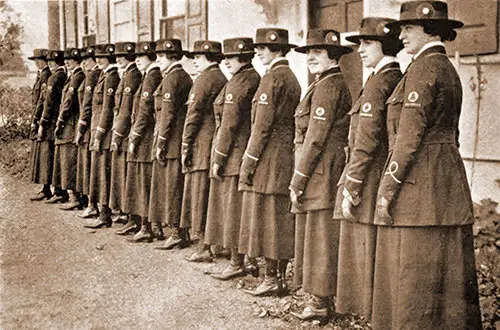
Telephone Operators of the Bell Telephone Company of Pennsylvania, at Camp Dix, New Jersey. Circuits of Victory, 1921. GGA Image ID #
The first unit of telephone girls, numbering thirty-three, of which I was a member, arrived in Paris on 24 March 1918, about 9:30 p. m., after a rather eventful journey.
An army officer who had boarded the train several hours out of Paris told us that shells fell in Paris every ten minutes. All the train lights were camouflaged, and so were all the streetlights on our arrival at the station.
Weary and tired after a nine-hour ride on a French train, we had to walk about twelve blocks with all our hand baggage to the Hotel Petrograd, at that time the Headquarters of the YMCA
Shortage of fuel made it impossible to have a warm bath, so we cheerfully took cold sponge baths and retired as soon as possible.
At 2 a.m., all the siren whistles in the city sounded, and we were madly rushed to the cellar, as that meant an air raid by the Boches. For the first time, we heard the loud sounds of exploding shells and barrage fire.
Most of us were too tired to care much, and as the cellar had been comfortably fixed, some slept. At seven the following day, we had breakfast—a French breakfast consisting of coffee, bread, and jam.
Another 'lady" joined us in Paris that day—Big Bertha. She created considerable conjecture, for no one imagined it was a long-distance gun.
Everyone looked up in the clouds for the invading Gotha. But before long, they found out who it was that was making all the racket.
They did create some confusion, though, and made some fascinating "rooms," but we didn't mind them nearly as much, I'm sure, as the Germans would have wished.
(Later, we worked out a schedule for Bertha. For several days on end, she would visit us punctually every fifteen minutes. Places were struck all around us, but fortunately, neither our office, which was then the Élyseé Palace Hotel nor our house, which was the Hotel Ferras, was touched.
It was about a fifteen-minute walk from the Élyseé Palace Hotel to the Hotel Ferras. At lunchtime, the operators would wait for a report from the big gun and would hurry home as fast as they could, arriving there just ahead of Bertha's subsequent greeting.)
On our first day in Paris, the girls were all assigned to different offices; eleven to Chaumont, twelve to Tours, and ten to Paris.
I Was Assigned to Paris
The following day we were ordered up at 5:30 a. m. and after taking the other girls to their trains, Lieutenant Hart, in charge of the Paris telephone office, took us to the Hotel Mediterranee, at that time the American headquarters in Paris.
Our supervisors told us to get ready to start work at once. The Telephone Exchange was currently being operated by English-speaking French girls, with an American sergeant acting as chief operator, information, and all-around factotum. (Note 4)
They had a seven-position board, with hardly any designation strips and no regular directory. The French girls we replaced had been in the office since its infancy, so they knew all the numbers and did not feel the necessity of having a directory.
They resented our coming, as it put them out of good jobs, and all but two left that morning. This made it doubly difficult for us. As no one called by number, Sergeant Jennings had to stand behind the operators and give out the numbers impromptu upon demand.
Poor chap! he had an awful job on his hands.
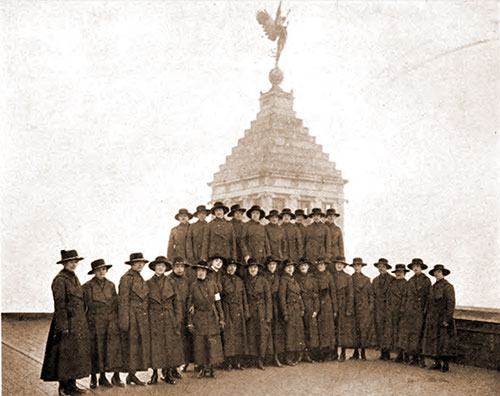
First Telephone Operating Unit to Go Overseas. View Taken on the Roof of 195 Broadway, New York City, with the Bronze Herald of the Spoken Word, Annihilates Space, Overlooking the Scene. Photo by Morris Rosenfeld. Circuits of Victory, 1921. GGA Image ID #
Before long, we had a directory made up, as the American telephone operators had effected a more efficient arrangement of the boards, and we began to have a little system. Later on, things ran as smoothly as clockwork.
Frequently, during the early days, after saying "number please," there would be a silence, broken by an awed, "Oh 1" Sometimes it would be, "Thank heaven, you're here at last!" One man called for the American Ambassador and added, "God bless you!"
At the time we began, there were four American exchanges in Paris:
Our Headquarters
The Air Service headquarters on Avenue Montaigne
The Research and Inspection Division on the Boulevard Montparnasse
The American Provost Marshal on the Rue St. Anne
French girls still operated all these, and to say that they were challenging to deal with, would be, to put it mildly.
Most of our toll calls, in fact, had to go over the French lines, and that sometimes made things very trying.
When you wished to call over the French line, you said, "J'ecoute" (I listen).
After a quarter of an hour, the conversation would begin.
"Good morning, how are you? Are you tired? If you please, I should like to get ________."
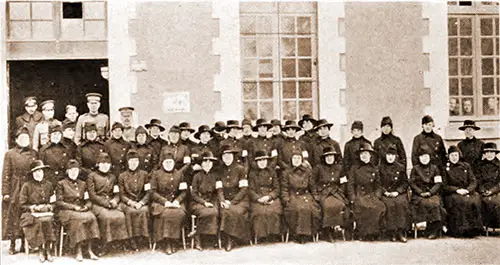
Telephone Operators at Barracks 66, Tours, France, 19 April 1918. Official US Army Photograph. Circuits of Victory, 1921. GGA Image ID #
All this had to be in honeyed tones; otherwise, there wasn't the slightest chance of getting any attention.
And mademoiselle would reply, "Ah oui," in a passive sort of way, as if the call were of no particular moment, but might as well be handled, now that she was about it.
If you asked for one place too often, you committed a serious blunder, for the result would be something like this: "You are unbearable, you ring too much, it gets on my nerves. Je coupe! (I disconnect) and—bing! The line would be lost, and that was an end to that.
But sometimes, our nerves got pretty well on edge, too.
There was a particular line which, though numberless, was known as Colonel Hall's line. Where it was, or who Colonel Hall was, no one knew. All we did know was that Colonel Hall was very hard to deal with, touchy and exacting. To make it worse, he was always calling some obscure town which had to be reached through the French Central.
One day it had been swamped. Miss Naismith was supervising. She was also doing information work, and from answering the numerous questions which were being fired at her from all sides, her head was in a whirl.
During this chaos, Colonel Hall's line signaled, and he demanded the supervisor.
"I must have my call for ________ at once!" he demanded.
A little impatiently, he was assured he would get his party as soon as the American operators could negotiate the call through the French Central.
"How I know I'm difficult, supervisor," came from the other end of the line, "but my calls are vital. I'm a medical officer with two wards of wounded men who should be operated on. I cannot do it until I receive some ether. There is not a bit of it anywhere around here. I must get it from the place I am calling."
"Colonel Hall, I'm ashamed," was the humble response.
"Anything that is in my power, I shall do for you. I shall call you shortly."
Immediately she called the supervisor in the French office and told her that an American General wished a connection through to ________ at once.
Nothing less than a general's rank could make an impression on the French operating force. Colonel Hall probably does not know to this day that he was thus temporarily promoted. All he does know is that he got his call through very shortly after he had put it in, and Miss Naismith went to bed that night praying that the ether arrived in time.
And so it went. War was war, we simply had to make good, and so we did our best.
Of the operators assigned to other places in the A. E. F.; of those who came later (there were 233 in all who crossed, in six operating units, besides hundreds of others under training at the time of the Armistice); of the superb spirit displayed by these girls at crucial stages of the conflict, and the invaluable service rendered at the front during the major engagements,—more will be told in later installments of the main narrative.
Note 1: This is the story, substantially, of Harry A. Williams, published in the Los Angeles (Cal.) Times of 14 May 1918.
Note 2: Report of the Chief Signal Officer to the Secretary of War, 1919. Government Printing Office.
Note 3: 21 May 1918, p. 13.
Note 4: This was Sergeant Jennings of Kansas City, detached from the 412th (Southwestern Bell) Telegraph Battalion, to open the Paris telephone exchange, using, at first, French girls during the day and American soldiers at night.
A. Lincoln Lavine, "Chapter XXV: Number, Please, A. E. F.!" in Circuits of Victory, New York: Country Life Press/Doubleday, Page & Company, 1921, pp. 268-281.
